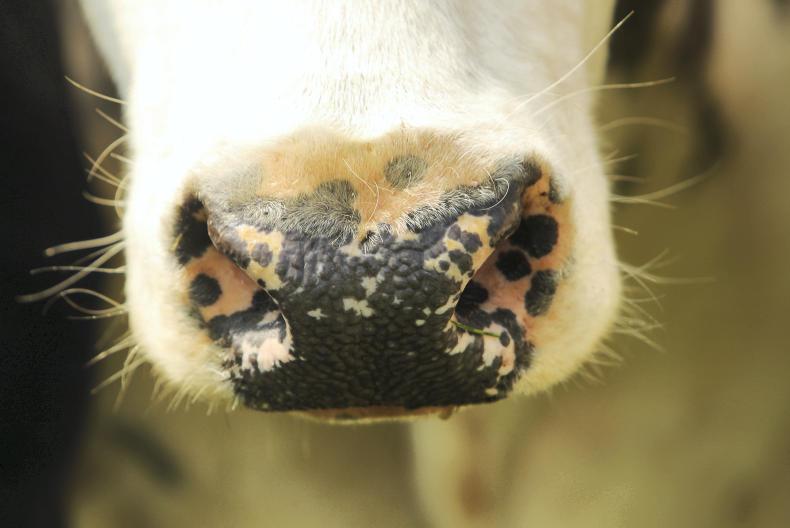Dairy Industry Ireland has been working to assure all supply lines are kept open to manage dairy product flows to ensure the industry can keep the shelves and fridges stocked across the European Union, including across borders, as Europe adjusts to the coronavirus pandemic.
Dairy Industry Ireland (DII) director Conor Mulvihil said while it is vital that we continue to supply the Irish domestic market, it is also important to remember that Ireland exports over 90% of its dairy, the vast majority of this to the single market.
“It is hugely important from a public health and nutrition, as well as an economic, perspective for Ireland Inc that we keep these supply chains moving,” he said.
DII has been working with colleagues in the Department of Agriculture, in Northern Ireland and across the European Dairy Association (EDA) to:
Guarantee a frictionless continuity for all milk collection operations across Ireland and the European Union, including across borders.Assure all supply lines are kept open to manage product flows to ensure the industry can keep the shelves and fridges stocked across the union, including across borders.
Eight key points
In tandem with colleagues in the EDA, Mulvihill said DII has communicated the following eight principles to EU regulators and politicians.
1. The smooth and constant supply of milk and dairy products for the population across the union is of vital importance in all stages of the Covid-19 management plans and in all parts of the union, at whatever level affected by the virus.2. Milk and dairy are not a virus transmission vector: the European Food Safety Authority (EFSA) repeated on 9 March 2020 that transmission of the virus through food does not occur.3. Raw milk is a highly perishable product that requires processing within 48 hours. Milk collection operations must be maintained without any interruption across the union. 4. The dairy sector supply chains are completely interlinked across regions and borders in terms of raw milk collection, dairy-based ingredient flux and milk and dairy products logistics.5. Over the past days, we have seen a significant increase in milk and dairy demand in basically all EU member states as Covid-19 restriction plans are ramped up.6. This makes it even more critical that supply lines across borders are kept open to manage product flows to ensure the industry can keep the shelves and fridges stocked. 7. Food business operators (dairies and logistic service providers) have established – in addition to the existing hygiene rules, especially Regulation EU 854/2004 - specific rules for milk collection and milk and dairy logistics (notably for the personnel within the logistic chain: personal hygiene, personal distance, no physical contacts, wearing a sanitary mask and gloves during milk collection or delivery operations).8. Increasing milk production within the union up to the seasonal peak (April to June) will even sharpen the challenge for the dairy sector in terms of milk logistics (from milk collection to milk and dairy product deliveries) and milk processing. Any additional barrier will inevitably lead to a situation in which failing milk collection and shortages in milk and dairy supply cannot be excluded. Critical priorities
Minister Creed has also confirmed from a Department of Agriculture perspective that “keeping food and other processing facilities operational” are “among the critical priorities for the Department”.
“Dairy Industry Ireland continues to engage with all companies daily to sure a co-ordinated approach is applied across the Irish dairy and specialised nutrition processing sector," Mulvihill said.
“We as an association have been taken aback of the commitment by suppliers, drivers, staff and management and we will continue to support them in this unprecedented time,” he said.

Calls for supply chain to be protected
Sinn Féin’s agriculture and food spokesperson Brian Stanley has called for appropriate measures to be implemented in the agri-food sector to ensure food supply chains continue to operate as usual.
"It is vitally important to ensure that food production for the domestic and export market is not interrupted by Covid-19.
"To achieve this, we need to ensure that workers fulfilling those vital jobs are protected and can continue to do their work. This means enforcing the two-metre rule and on-site hygiene best practice,” he said.
He has called on Minister Creed to establish a national taskforce for the agri-food sector.
“It is essential that farmers, the Department, Teagasc and other stakeholders work together in a co-ordinated way to ensure the continued operation of food supply chains.
"These are difficult times for farmers and workers in the sector. They need flexibility from our banks and lending institutions to reschedule repayments for farmers and the availability of overdraft facilities,” Stanley said.
Dairy Industry Ireland has been working to assure all supply lines are kept open to manage dairy product flows to ensure the industry can keep the shelves and fridges stocked across the European Union, including across borders, as Europe adjusts to the coronavirus pandemic.
Dairy Industry Ireland (DII) director Conor Mulvihil said while it is vital that we continue to supply the Irish domestic market, it is also important to remember that Ireland exports over 90% of its dairy, the vast majority of this to the single market.
“It is hugely important from a public health and nutrition, as well as an economic, perspective for Ireland Inc that we keep these supply chains moving,” he said.
DII has been working with colleagues in the Department of Agriculture, in Northern Ireland and across the European Dairy Association (EDA) to:
Guarantee a frictionless continuity for all milk collection operations across Ireland and the European Union, including across borders.Assure all supply lines are kept open to manage product flows to ensure the industry can keep the shelves and fridges stocked across the union, including across borders.
Eight key points
In tandem with colleagues in the EDA, Mulvihill said DII has communicated the following eight principles to EU regulators and politicians.
1. The smooth and constant supply of milk and dairy products for the population across the union is of vital importance in all stages of the Covid-19 management plans and in all parts of the union, at whatever level affected by the virus.2. Milk and dairy are not a virus transmission vector: the European Food Safety Authority (EFSA) repeated on 9 March 2020 that transmission of the virus through food does not occur.3. Raw milk is a highly perishable product that requires processing within 48 hours. Milk collection operations must be maintained without any interruption across the union. 4. The dairy sector supply chains are completely interlinked across regions and borders in terms of raw milk collection, dairy-based ingredient flux and milk and dairy products logistics.5. Over the past days, we have seen a significant increase in milk and dairy demand in basically all EU member states as Covid-19 restriction plans are ramped up.6. This makes it even more critical that supply lines across borders are kept open to manage product flows to ensure the industry can keep the shelves and fridges stocked. 7. Food business operators (dairies and logistic service providers) have established – in addition to the existing hygiene rules, especially Regulation EU 854/2004 - specific rules for milk collection and milk and dairy logistics (notably for the personnel within the logistic chain: personal hygiene, personal distance, no physical contacts, wearing a sanitary mask and gloves during milk collection or delivery operations).8. Increasing milk production within the union up to the seasonal peak (April to June) will even sharpen the challenge for the dairy sector in terms of milk logistics (from milk collection to milk and dairy product deliveries) and milk processing. Any additional barrier will inevitably lead to a situation in which failing milk collection and shortages in milk and dairy supply cannot be excluded. Critical priorities
Minister Creed has also confirmed from a Department of Agriculture perspective that “keeping food and other processing facilities operational” are “among the critical priorities for the Department”.
“Dairy Industry Ireland continues to engage with all companies daily to sure a co-ordinated approach is applied across the Irish dairy and specialised nutrition processing sector," Mulvihill said.
“We as an association have been taken aback of the commitment by suppliers, drivers, staff and management and we will continue to support them in this unprecedented time,” he said.

Calls for supply chain to be protected
Sinn Féin’s agriculture and food spokesperson Brian Stanley has called for appropriate measures to be implemented in the agri-food sector to ensure food supply chains continue to operate as usual.
"It is vitally important to ensure that food production for the domestic and export market is not interrupted by Covid-19.
"To achieve this, we need to ensure that workers fulfilling those vital jobs are protected and can continue to do their work. This means enforcing the two-metre rule and on-site hygiene best practice,” he said.
He has called on Minister Creed to establish a national taskforce for the agri-food sector.
“It is essential that farmers, the Department, Teagasc and other stakeholders work together in a co-ordinated way to ensure the continued operation of food supply chains.
"These are difficult times for farmers and workers in the sector. They need flexibility from our banks and lending institutions to reschedule repayments for farmers and the availability of overdraft facilities,” Stanley said.











SHARING OPTIONS